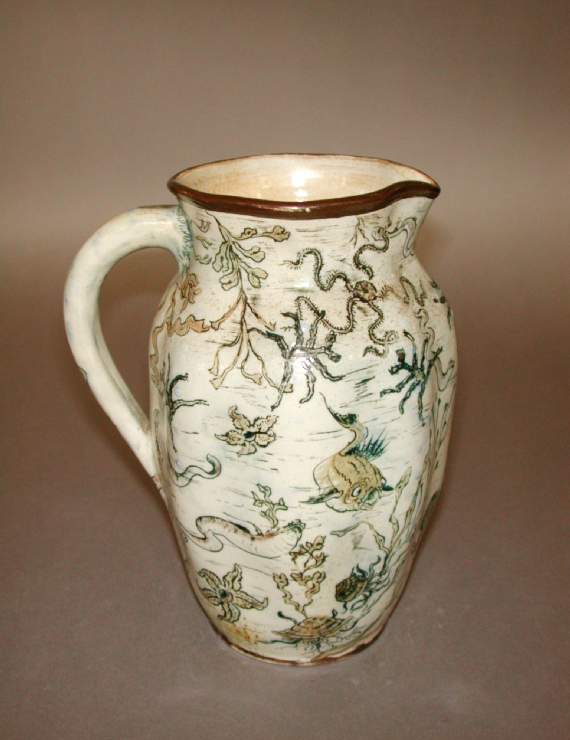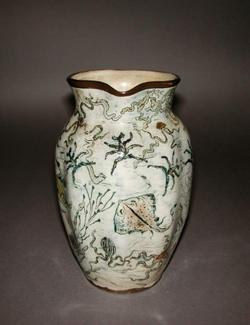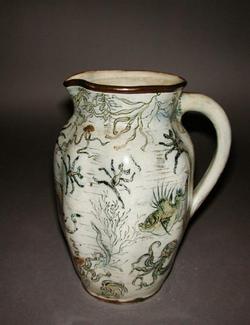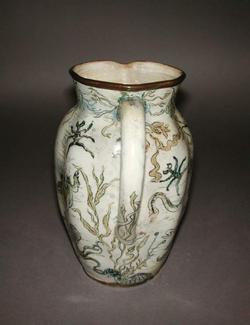Current Location: Gallery 27 (Glaisher)
Maker(s)
Pottery:
Martin Brothers
Decorator:
Martin, Edwin
(Probably)
Entities
Categories
Description
Salt-glazed stoneware jug with incised and painted decoration.
Thrown and salt-glazed stoneware jug with oviform body and wide neck pinched into a lip in front. The sides of the body are flattened to form eight vertical ribs; the handle, applied between neck and lower body, is opposite the lip. Covered with cream slip and decorated with incisions and painting in blue, brown and buff to depict marine plants and sea-creatures in water. The rim and base are outlined in brown. The underside is slightly concave and mainly unglazed, with the makers' name and date 9-1890 incised in script.
Notes
History note: Martin Brothers shop in Brownlow Street, London, where bought in 1899 by Dr. J.W.L. Glaisher, FRS, Trinity College, Cambridge
Legal notes
Dr J.W.L. Glaisher Bequest
Measurements and weight
Height: 21.5 cm
Height: 9.4 in
Acquisition and important dates
Method of acquisition: Bequeathed
(1928-12-07)
by
Glaisher, J. W. L., Dr
Dating
19th Century, Late
Victorian
Production date:
dated
AD 1890
Note
Robert Wallace Martin (1843-24) and his brothers Walter (1857-1912) and Edwin (1860-1915) were amongst the first ‘artist-potters’ of the late nineteenth century. They designed, made and decorated their own ornamental salt-glazed stoneware, originally using facilities at C.J.C.Bailey’s Fulham Pottery and, briefly, at Shepherd’s Bush. In 1877, they opened their own pottery at Southall, Middlesex, and by 1882 were producing some 5,000 pieces a year. Wallace had originally trained as a sculptor, exhibiting his work at the Royal Academy and elsewhere from c.1863. His younger brothers had learned their skills at Doulton’s, Walter as a thrower and chemist, Edwin as a decorator. Modelled work is generally attributed to Wallace, but otherwise it is thought that the three learned from each other, exchanging skills and sharing roles. A fourth brother, Charles (1846-1910), sold the products – known as ‘Martin-ware’ – from a shop at Brownlow Street, London.
This is one of a number of examples of Martin Brothers’ vases and jugs decorated with an all-over pattern of marine life, which were inspired by Japanese work. The decoration is generally thought to be by Edwin Martin, though Malcom Haslam suggests that Walter E Willy, who worked for the Martins until 1899, may have originally drawn the fish with comical faces (Haslam, 1978,p.71).
School or Style
Art Pottery
People, subjects and objects depicted
Components of the work
Decoration
composed of
oxide colours
Whole Incl. Handle
Width 18 cm
Width 7 in
Body
Materials used in production
Salt-glaze
Stoneware
Techniques used in production
Salt-glazing
Inscription or legends present
Inscription present: the s in Bros is raised
- Text: 9-1890/Martin Bros/London & Southall
- Location: Underside of base
- Method of creation: Incised
- Type: Mark
Inscription present: rectangular black label handwritten in black ink
- Text: A Martinware glazed with salt. Bought from Mr Martin at his shop in Brownlow St about 1896
- Location: Underside of base
- Method of creation: Handwritten in black ink
- Type: Label
References and bibliographic entries
Identification numbers
Accession number: C.1224-1928
Primary reference Number: 71621
Old object number: 961
Stable URI
Audit data
Created: Saturday 6 August 2011
Updated: Tuesday 30 April 2024
Last processed: Tuesday 15 July 2025
Associated departments & institutions
Owner or interested party:
The Fitzwilliam Museum
Associated department:
Applied Arts







